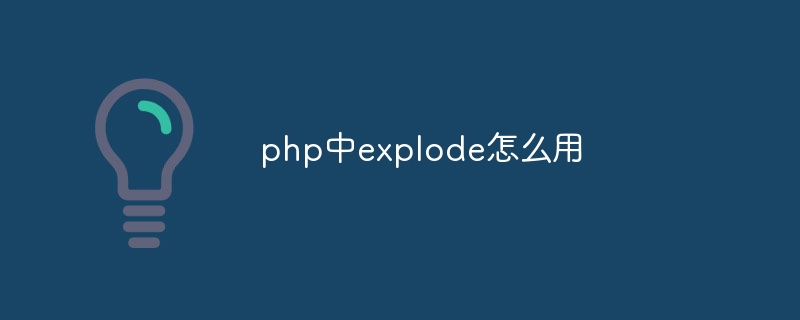Home >Backend Development >PHP Tutorial >How to use explode in php
How to use explode in php
- 下次还敢Original
- 2024-04-27 16:45:461253browse
The explode() function in PHP can split a string into an array according to a given separator, including the following steps: Determine the separator ($separator), which is the substring used for splitting in the string . Specify the string to split ($string). Use $array = explode($separator, $string); to split the string and store it in $array. The explode() function returns an array containing the split string fragments.

explode() function in PHP
explode() function in PHP Used to split a string into an array based on the given delimiter. It accepts two parameters:
- $separator: separator, which is the substring used to split the string.
- $string: The string to be split.
Usage:
<code class="php">$array = explode($separator, $string);</code>
Return result:
##explode() Function return An array containing split string fragments. If the delimiter is not in the string, the function returns an array containing the entire string.
Example:
<code class="php">$str = "PHP,JavaScript,HTML,CSS";
$array = explode(",", $str);
print_r($array);</code>
Output:
<code>Array
(
[0] => PHP
[1] => JavaScript
[2] => HTML
[3] => CSS
)</code>
Notes:
- The delimiter can be a single character or a string.
- If the delimiter is the empty string, the function splits each character in the string into separate elements.
- If the delimiter appears multiple times in the string, the function will split the string based on each occurrence.
- If the delimiter does not exist in the string, the function returns an array containing the entire string.
The above is the detailed content of How to use explode in php. For more information, please follow other related articles on the PHP Chinese website!
Related articles
See more- How to set border color gradient in css3? Two implementation methods of css3 border color gradient
- How to set background image with css? background attribute adds background image
- What does margin:auto mean in css? Detailed explanation of the usage of margin:auto attribute
- How to set font size in css
- How to set css to exceed the display ellipses

